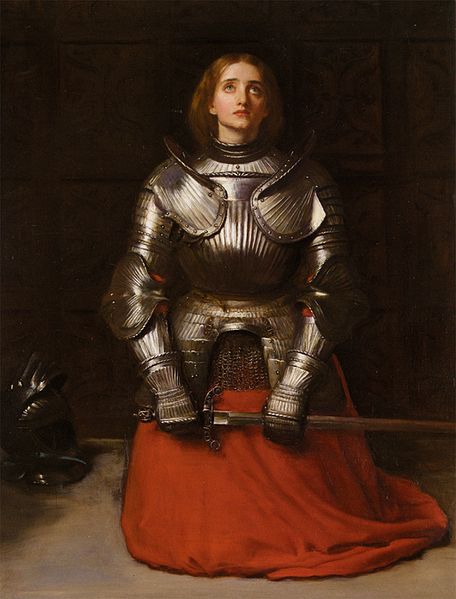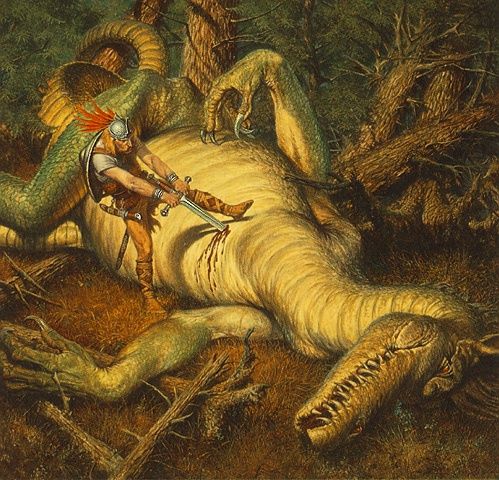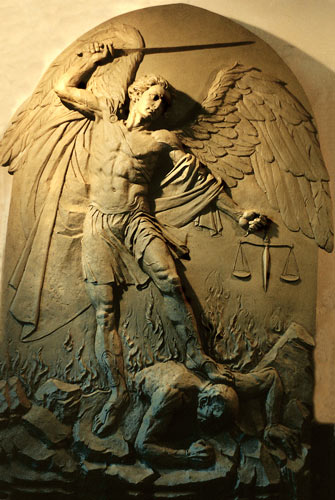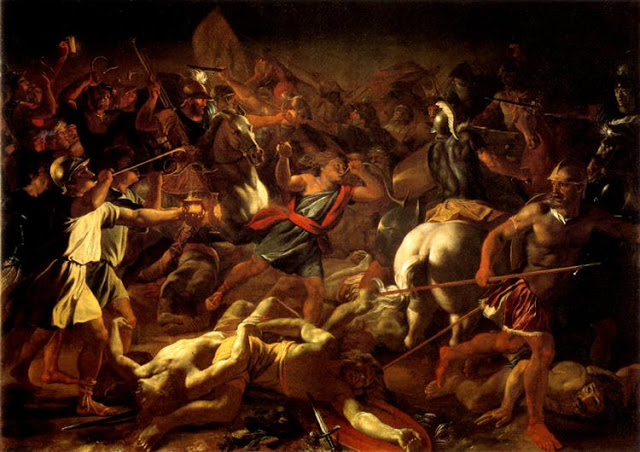The Sacredness of Your Child's Imagination: Part I
Posted on June 15, 2017 by Katherine Ruch
In the middle of the night, my six year old came into our bedroom wanting to crawl into bed with us, saying he had had a very bad dream. When I cuddled him close I asked him if he wanted to tell me about it. He said he didn't want to tell because it was so upsetting. I prayed for him and assured him of his safety. But he could not fall asleep again. He whispered, "When I close my eyes, the evil man is still alive."
Isn't that the case with all of our imaginations? It is the world fully alive when we close our eyes, when we gaze out the window, when we are still.
I knew that simply telling Becket that the evil man wasn't real was not going to resolve the vividness of the threat so alive in his imagination. For, in fact, his imagination was dealing with an evil that is real, only symbolized in the evil man. His six year old world is expanding to include an understanding of evil. What he needs from me is the help to know what his posture is to be to that evil. Is it fear? Is it placation? Is it denial?
So I told him that the next time he saw that man, I wanted him also to see the army of heavenly angels, armed with swords (it is easy for him to imagine any number of medieval knightly swords because of the books he pours over) standing with him against the evil man. Some time later after dozing in and out, I asked him how it was going. He said the evil man had been destroyed.
To say that what is in one's imagination is not real is to misunderstand the imagination. The imagination carries the symbols of the world that bind up realities seen and unseen, often realities too expansive to be expressed in anything other than images and symbols. The question is whether or not one's imagination has the true symbols, the symbols that express what is ultimately and eternally true. A healthy, true, vivid imagination is the greatest aid in living a life of virtue. Though Becket's battle was in his imagination, he was internalizing the courage to stand against evil with the weapons God has given his people and to see good triumph. This is real.
Our children have eternal souls, and they will participate during their lifetimes in the battle of all time--the battle between good and evil. As they mature, they have a growing realization of what that battle is and the forces that array the battlefield. The evil is an evil they will not always see, just as the courage and virtue required to overcome such evil is also forged in secret. Because we cannot see the spiritual entities that surround us--demons, angels, and more--and because the dark often poses as the light, and the good might come in an unassuming form, we will need healthy imaginations and mature, spiritually developed skills of discernment to recognize evil and know how to confront it with the victorious good.
Every person has an imagination. It is either full of true riches and becomes a tremendous assistance in feeding wholesome vision, thought, action, and character. Or it is depleted, perhaps distorted, and actually prevents a person from becoming all he or she was meant to be. We have a symbolic system for evil and for good, for God and for the Church. We have imaginations replete with images of what it means to be a woman or a man or a family or a friend, what it means to be a successful person. Sometimes these symbols embody the true real, and sometimes they are polluted with the false. But our imaginations have everything to do with who we become as people.
Good requires a richer imagination. Sadly, we often have more imagination for the unhealthy and twisted. We see this in Hollywood depictions of character--the good characters are often lacking depth and interest. They are predictable, boring, simple minded and insipid, while the bad characters are intriguing, multi-layered, intelligent and strong.
Every child is born with an imagination that will be captured by some system of thought, populated by images that shape who he or she grows to be. As parents, we need to wake up and realize that our children have an enemy, Satan himself, and his first access to them is through their imaginations, and he is busy using anything at his disposal to gain ground, while we often are blinded to the battle raging already to steal their souls through the inroads of their imaginations.
Michael O'Brien, in his book, A Landscape with Dragons: The Battle for Your Child's Mind, (a book I highly recommend), speaks of the danger of not recognizing the battle and inadvertently teaching children to "tame the dark side," to "embrace the shadow," rather than to teach our children how to approach evil with "confident realism." He says: "...it did strike me as odd the way so many people were beginning to talk about evil as if it were all a great misunderstanding, as if the complexity of the universe could be reduced to the operations of the psyche."
The battle is spiritually charged, this is why we cannot adjust and diminish the symbols that keep the lines of battle clear. In the symbolic world, trolls are always evil, as are dragons, goblins, and witches. They are not simply misunderstood and awaiting reformation. And in the overarching REAL story, these figures are always eventually vanquished, even if for awhile they were able to deceive, control, and maim. This confidence of evil eventually being overcome by God and those who trust in him, must be in the gut of every child's symbolic system for him to live in more than what is immediately visible.
Satan uses the worldly culture in which we live to own our children’s imaginations. He wants them caught in the materialistic fray that will keep their eyes busy in the here and now, never able to lift them up to the transcendent MORE, the Unseen Real. And the culture is glad to be complicit. Your child will grow to be a consumer and put money in their pockets. Your child will watch their movies, eat their cereals, buy their toys, wear their clothes. Advertisers sit around and plan how they can capture your child’s imagination, how they can make your child into a life-long consumer, desperately needing to be a part of only what they can see.

Joan of Arc by John Everett Millais: a woman who listened to God, cared little what others thought of her,
a valiant leader who fought on behalf of others with courage and self-sacrifice.
Through our imaginations, Satan can control our capacity to be fully alive by deadening us and reducing us to something very small and limited. He wants us to believe that this world is ALL there is. It is like the Green Lady in Lewis' Silver Chair who tries to hypnotize the children into believing that there is no sun, only the lamp in the room, no lion, but a small cat.
A well developed imagination can lift outside of the here and now, can rise up above and see beyond. A vibrant imagination can see the manipulations of an ad because the vision of the world they know in their imaginations is so much broader and richer than such drivel. A child being bullied at school who has had an imagination rich with story knows the end desserts of a bully and can be noble in the face of it, remembering that in due time, the noble knight wins the battle.
In Isaiah it says, "You will keep in perfect peace him whose imagination is stayed on you." If our imaginations are directed toward what is of God, what is true, good, beautiful, we will have internal peace. This is why the Apostle Paul tells us in Philippians 4:8, "Whatever is true, whatever is honorable, whatever is just, whatever is pure, whatever is lovely, whatever is commendable, if there is any excellence, if there is anything worthy of praise, think about these things." This comes right after his admonition not to be anxious about anything. This is how we do it: we fill our imaginations with a resovoir that we can draw from in our day to day life. Is this maybe one of the reasons our children of today are wracked with anxiety? Their imaginations do not have the resources to conquer fear with love, ugliness with beauty, cheapness with what is costly and honorable.
In The Sacredness of your Child's Imagination, Part II, I will explore more practical ways to do this as parents.





